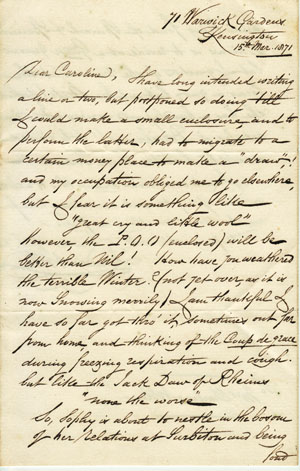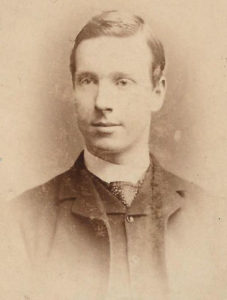In our rapidly changing world, preserving private collections of historical documents and personal archives has never been more important. Over the last 20 or 25 years I have been involved in a significant amount of historic research. This has led me to look into the lives of a great many individuals long since dead. As a result I have amassed a sizeable collection of ephemera, including personal letters, photographs, deeds, private paperwork and so on.
 It is amazing what can be found from a few letters and a couple of photographs. Basic births deaths and marriage archive starts to build a family tree and a brief scan of the news archives can sometimes reveal a little bit more than we would normally expect. The letters and other documents open up a window into the feelings and opinions of the person. The photographs add the faces of those we are researching. The overall outcome is a preserved record of a person. A record that wasn’t destroyed in life and therefore was left for us to discover.
It is amazing what can be found from a few letters and a couple of photographs. Basic births deaths and marriage archive starts to build a family tree and a brief scan of the news archives can sometimes reveal a little bit more than we would normally expect. The letters and other documents open up a window into the feelings and opinions of the person. The photographs add the faces of those we are researching. The overall outcome is a preserved record of a person. A record that wasn’t destroyed in life and therefore was left for us to discover.
Why is this so important you ask yourself? The answer is that there is nothing better than touching history – the closer you can get to the past the greater the understanding we have of the present.
Just because a someone is no longer with us and possibly passed away a hundred years back or a few decades ago it does not necessarily mean that person’s life has disappeared for ever. Although they might be strangers, over a period of time during the research they can in a way become quite close.
I think it’s always interesting to know how life really was and how people managed in days gone by. What it was really like for all classes of our country, how people worked and how they survived. The ups and downs, the traumas as well as the good times and the celebrations – it is all blended together in a mix that was someone’s life.
If you are one of those people who consider that history is so dreadfully boring then please do think again.
In a way the greatest adventures are those that happened before we were born. Everybody was someone even those whose lives were so very brief.
Preserving the Forgotten: A Call to Honour the Lives of Ordinary People Through Historical Integrity
 In our rapidly changing world, preserving the memories, thoughts, and inspirations of those who came before us has become more important than ever. These are not just the stories of celebrated figures or notable historical icons, but of ordinary people who lived ordinary lives—individuals whose contributions, experiences, and stories form the fabric of our shared human history. These lives, though seemingly modest, hold a wealth of insight into the past, offering us a richer understanding of the everyday experiences that shaped our world. Yet, through the relentless march of time, these stories are at risk of being lost, obscured, and ultimately forgotten.
In our rapidly changing world, preserving the memories, thoughts, and inspirations of those who came before us has become more important than ever. These are not just the stories of celebrated figures or notable historical icons, but of ordinary people who lived ordinary lives—individuals whose contributions, experiences, and stories form the fabric of our shared human history. These lives, though seemingly modest, hold a wealth of insight into the past, offering us a richer understanding of the everyday experiences that shaped our world. Yet, through the relentless march of time, these stories are at risk of being lost, obscured, and ultimately forgotten.
In recent years, a troubling trend has emerged, particularly on auction sites like eBay, where sellers list unnamed photographs, forgotten documents, and seemingly irrelevant pieces of ephemera. These items, which once held significant personal meaning, are often extracted from larger collections, separated from the context that once imbued them with value and identity. This disassembly of collections results in a profound loss: the identity and story of the person to whom these items once belonged become severed from their artefacts, fading into anonymity.
The frustration of sifting through these listings is palpable—not because these items are without value, but because their value is intrinsically tied to the identity and narrative that has been stripped away. Without the context of a complete collection, a photograph of a family gathering, a letter to a loved one, or a diary entry becomes little more than a relic, its story fragmented and incomplete. The individual who once stood behind these items becomes a ghost in the historical record, their story fragmented and, in many ways, erased.
I fundamentally disagree with this practice. It is a misguided approach that prioritises short-term profit over long-term cultural value. By breaking up these collections for individual sale, sellers devalue not only the items themselves but also the lives and legacies they represent. These pieces are more than mere objects; they are tangible connections to lives once lived, to stories that deserve to be remembered and shared. Each photograph, each letter, each keepsake is a thread that ties us to the past, a reminder of the humanity we share with those who came before us. When these threads are severed, we lose a part of our own story.
A Disrespect for the Past
The decision to break up collections is, in essence, a decision to disregard the importance of the past and the people who are no longer with us. It reflects a mind-set that sees the past as a commodity to be bought and sold rather than as a shared heritage to be cherished and preserved. This approach not only diminishes the value of individual lives but also robs future generations of the opportunity to learn from the rich tapestry of history woven by everyday experiences.
Each of these lives, though ordinary in their own time, holds a mirror to our own existence. They show us the evolution of society, the shifting norms, the simple joys and struggles that define human experience. When we lose these stories, we lose the opportunity to see ourselves reflected in the past, to find common ground with those who lived before us, and to understand how their experiences have shaped the world we inhabit today. This loss is not just a loss for historians or collectors; it is a loss for all of us.
A Call for Change: Preserving Private Collections with Integrity
We are at a critical juncture. If we continue on this path, the stories of countless individuals will be lost forever, their names and faces consigned to oblivion. To prevent this loss, we must adopt a new approach—one that respects the dignity of those who are no longer with us and acknowledges the value of their stories. I propose a shift in how we handle private collections, one that prioritises preservation over profit and cultural integrity over commercialisation.
First, we should establish pathways for private collections of historical significance to be donated or sold intact to institutions, archives, or museums. By doing so, we can ensure that the identity of the individual connected to these collections is preserved alongside their artefacts. Institutions such as local historical societies, community archives, and museums are often better equipped to maintain these collections, safeguarding them as part of a broader narrative rather than allowing them to be dispersed into obscurity.
Additionally, we can create digital archives as a modern solution to preserving these collections in their entirety. With advances in digital technology, it is now possible to catalogue and share entire collections online, making them accessible to researchers, historians, and the general public without compromising their integrity. Digital archives allow for the preservation of both physical artefacts and the stories that accompany them, offering a space where these narratives can be shared, explored, and remembered by a global audience.
Such an initiative would not only help preserve the stories of individuals but would also provide valuable resources for those who wish to understand the history of ordinary people. It would allow families, communities, and historians to reconnect with their roots, offering a way to remember those who might otherwise be forgotten. By keeping collections intact, we ensure that the identities behind them remain connected to their stories, allowing future generations to understand and appreciate the full richness of our shared history.
A Vision for the Future
The time has come to recognise that the value of these private collections lies not in their potential for profit but in their potential to teach, to inspire, and to connect us with the past. By taking a more thoughtful approach to the preservation of personal history, we can create a future where the stories of ordinary people are not lost to time but are instead celebrated as part of our collective memory. We can ensure that the lives of those who came before us are not consigned to anonymity but are remembered for the contributions they made to the world we live in today.
In embracing this vision, we affirm that every life has value and that every story deserves to be told. We can build a society that honours the past, cherishes the present, and looks to the future with a deeper understanding of the human experience. It is not too late to change our approach, to create a world where the stories of ordinary people are preserved and celebrated for generations to come. Together, we can ensure that the rich tapestry of our shared history remains whole, vibrant, and accessible to all.
Ian Waugh
Amateur British Historian and History Enthusiast
